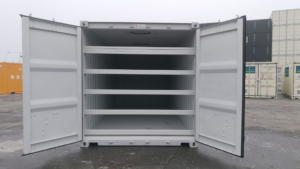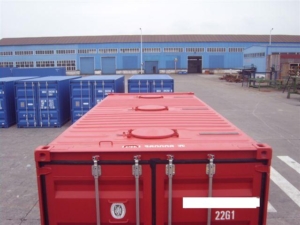Introduction:
In the vast expanse of the world’s oceans, a silent armada of bulk sea containers embarks on a journey, carrying with them the lifeblood of global trade. As these steel giants traverse the seas, one cannot help but wonder about the eclectic array of goods they harbor within their metallic walls. This article sets sail into the depths of containerized cargo, exploring the fascinating world of goods commonly transported in shipping containers.

The Versatility of Bulk Sea Containers:
Shipping containers, with their standardized dimensions and robust construction, are designed to accommodate a myriad of goods. From raw materials to finished products, their versatility knows no bounds. The sealed, weatherproof, and secure nature of these containers makes them an ideal choice for transporting a wide range of commodities across oceans and continents.
- Raw Materials and Commodities:
At the heart of global trade are the raw materials that fuel industries and economies. Bulk sea containers often carry massive quantities of minerals, ores, and agricultural commodities. From iron ore to grains, these containers become vessels of economic prosperity, connecting resource-rich regions with manufacturing powerhouses.
- Manufactured Goods:
Finished products, neatly stacked and secured within the containers, represent another significant category of cargo. Everything from electronics and machinery to textiles and consumer goods finds its way into these metal boxes. The ability to transport manufactured goods in bulk not only streamlines the shipping process but also contributes to the efficiency of global supply chains.
- Automobiles and Heavy Equipment:
The containerization of automobiles and heavy machinery has revolutionized the automotive and manufacturing industries. Bulk sea containers are employed to transport vehicles securely, protecting them from the elements and potential damage during transit. This practice ensures a seamless flow of automotive products across borders.
- Perishable Goods:
In the interconnected world of trade, perishable goods are a vital component of containerized cargo. Refrigerated containers, known as reefers, maintain specific temperature conditions, allowing the transport of products such as fruits, vegetables, seafood, and pharmaceuticals. This capability extends the reach of fresh produce to markets worldwide.
- Chemicals and Hazardous Materials:
The transportation of chemicals and hazardous materials requires a specialized approach to ensure safety and compliance with regulations. Bulk sea containers, equipped with features like ventilation and containment, facilitate the secure movement of chemicals critical to various industries, including manufacturing and agriculture.
- Construction Materials:
From timber and steel beams to cement and pipes, shipping containers play a pivotal role in the transportation of construction materials. Their stackability and durability make them an efficient means of delivering the essential components for infrastructure projects around the globe.
- E-commerce Shipments:
With the rise of e-commerce, bulk sea containers have become instrumental in the movement of goods from manufacturers to consumers. Small and large retailers alike utilize these containers to transport products, contributing to the swift and cost-effective delivery of items purchased online.

Exploring the Future: Innovations in Containerized Shipping
As we navigate through the currents of international trade, it’s essential to consider the innovations and trends shaping the future of containerized shipping. Several exciting developments are poised to redefine the landscape of bulk sea container transportation:
- Smart Container Technology:
The integration of smart technologies, such as IoT sensors and GPS tracking, is revolutionizing containerized shipping. Smart containers provide real-time data on location, temperature, humidity, and other environmental conditions, enhancing visibility and control over the cargo.
- Sustainable Shipping Practices:
In response to growing environmental concerns, the shipping industry is making strides toward sustainability. Innovations like eco-friendly container materials, energy-efficient vessel designs, and alternative fuels aim to reduce the carbon footprint of containerized shipping.
- Automation and Robotics:
Automation is increasingly becoming a part of container terminals and logistics hubs. Autonomous cranes, robotic loading and unloading systems, and AI-driven logistics optimization are streamlining operations, reducing costs, and improving overall efficiency.
- Blockchain in Supply Chain Management:
Blockchain technology is finding applications in supply chain management, providing a transparent and secure ledger for recording every transaction along the shipping route. This not only enhances traceability but also reduces the risk of fraud and errors in documentation.
- Container Design Innovations:
Ongoing research and development in container design focus on enhancing efficiency and versatility. Lightweight materials, collapsible containers for empty returns, and modular designs that allow for easy customization are some of the innovations on the horizon.
The Role of Bulk Sea Containers in Global Resilience
The world witnessed the resilience of containerized shipping during challenging times, such as the global pandemic. Bulk sea containers played a crucial role in maintaining the flow of essential goods, medical supplies, and equipment across borders, showcasing their adaptability and importance in times of crisis.
The adaptability of shipping containers extends beyond their physical structure to the agility of the logistics networks that support them. Flexibility in routing, rapid response to changing demand, and the ability to reroute containers mid-voyage contribute to the resilience of containerized shipping in the face of unforeseen challenges.
Challenges and Opportunities on the Horizon
While bulk sea containers continue to be a cornerstone of global trade, they are not without challenges. Addressing issues such as overcapacity, container shortages, and port congestion requires collaboration and innovation across the industry. The optimization of logistics networks, investment in infrastructure, and the adoption of digital technologies are key areas of focus to overcome these challenges.
Looking ahead, the opportunities for growth and improvement in containerized shipping are abundant. From leveraging big data analytics to optimize supply chains to enhancing sustainability practices, the industry is poised for transformative changes that will shape the future of shipping container transportation.
Conclusion: Sailing Towards a Connected World of Trade
As we sail through the diverse cargo of bulk sea containers, it becomes evident that these metal behemoths are the unsung heroes of global trade. From the raw materials that lay the foundation of industries to the finished products that grace store shelves, shipping containers facilitate the movement of goods that power economies and connect nations.
The journey doesn’t end with the unloading of cargo at a port; it extends to the vast networks of transportation, distribution centers, and retail outlets that form the backbone of our interconnected world. The humble bulk sea container, with its ability to traverse oceans and continents, continues to shape the landscape of international trade, weaving together the threads of commerce in a seamless and efficient manner. In the containerized world of goods, each voyage is a testament to the endless possibilities that await within the steel walls of these maritime workhorses.
CIMC Yang Zhou Base is a leading manufacturer of bulk sea containers and various other standard and special logistics equipment. With years of experience in the industry, it focuses on the design, production and distribution of high-quality innovative products that meet the specific needs of customers.
冷蔵コンテナ、コールドチェーン設備、コンテナ型設備統合、モジュール式建物など、高品質で革新的な物流設備が必要な場合、 CIMC Yang Zhou Base はあなたの最良の選択です。世界中のお客様からのお問い合わせを歓迎し、あなたと協力する機会を楽しみにしています。


